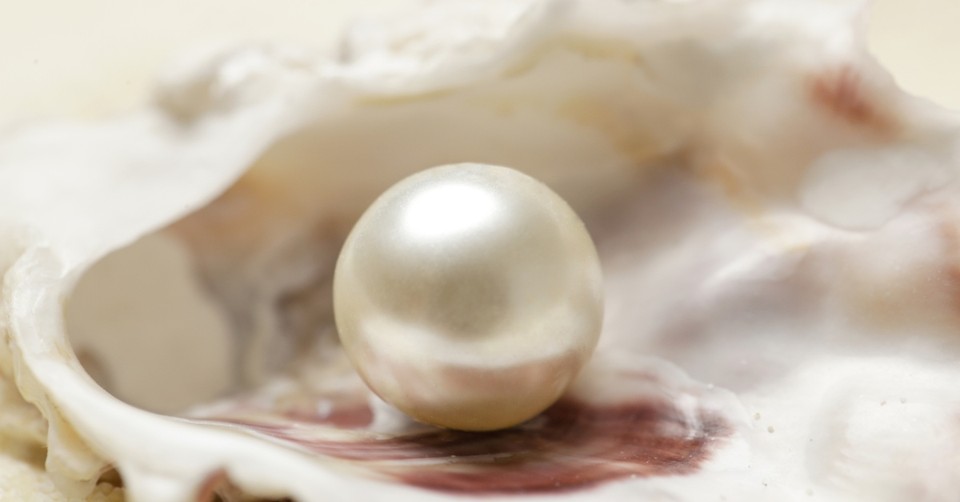What Is the ‘Pearl of Great Price’ in Scripture?

The kingdom of heaven is like a merchant looking for fine pearls. When he had found one pearl of great price, went and sold all that he had and bought it. – Matthew 13:45-46
Jesus taught using parables, and in them were images his audience could relate to. How is heaven like a pearl, and who is the merchant?
What Does a Pearl of Great Price Mean in Scripture?
This is a parable about what matters most to God and to us. Christ was “seeking, finding, and purchasing his elect” writes Matthew Henry. His people were “lost and going astray” but he valued them. Jesus “took much pains” to buy his people back. God’s people are a “pearl of great price; [...] very precious to God, so highly esteemed by Christ, as his portion, his inheritance, and his jewels.”
Christ was willing to give up everything—even his life—to buy us back, to redeem us, for eternal life with the Father in heaven.
One devotional writer talking about the pearl of great price asks “how strongly do you desire deeper relationship with him? How much would you give up to know him? What do you seek fulfillment in, during your free time?” Do we recognize how much we mean to God, and the enormous cost of our salvation?
So the parable is about how much we mean to God and how much Christ should mean to us. John Gill wrote that those “who are seeking after knowledge in every branch of it, natural, moral, and spiritual [...] may be compared to a ‘merchant man, seeking goodly pearls;’ and who find the Gospel, and prefer it to everything else.”
Nothing is worth more than this treasure: relationship with Christ.
Why Jesus Shares the Parable of the Pearl
The Jews were waiting for a soldier-savior, not a shepherd. Jesus was authoritative, confrontational, yet outrageously loving and gentle. Israel’s view of freedom was short-sighted and narrow and their picture of God was small. He doesn’t demonstrate power as men do; the Lord Almighty was offering his blood, the only blood sufficient to pay for all sins for all time for all believers.
Jesus used metaphors his audience would relate to. His listeners believed that their salvation was like a financial transaction: they paid for a place in heaven by strictly observing the law. Good behavior was their currency with God.
The pearl, however, gave God nothing except the joy of having it. God paid everything for this joy.
We don’t buy our place with God—we must accept that we were purchased for his pleasure, and the ransom was Christ’s very life. For this to make sense, we have to believe that God wants us to be with him, he cherishes us. This is difficult to grasp because we supply nothing he lacks.
What Makes This Pearl So Valuable?
We gain our value from the price paid for us.
The pearl isn’t valuable in itself, which is one hurdle to believing: we want to be special. We want to be uniquely valuable in our own right, able to prove our status in earthly ways. That’s bondage. We would cease to matter as soon as age, injury, or illness took these things from us.
The difference in worthiness between one person and the next is in whether he acknowledges that he was purchased, and at what cost. The world will pay just a few dollars for trinkets, but do we want to be worth so little? Can we admit that we want to be worthy of eternal love, and that such a thing is possible, even though we can never repay that price? And—here’s another hurdle—can we believe there is no catch?
The Mormon Controversy Regarding the Pearl of Great Price
Terryl Givens says in “Why do Mormons ignore the Pearl of Great Price?” that in this parable “you find all the distinctive doctrines of the LDS faith.” This is the parable upon which the “covenant theology” as defined by Mormonism rests. “Through both Abraham and Moses [...] we get the doctrine of premortal existence, the original instantiation of God’s covenant with the human race.” Then, “in the Pearl of Great Price [...] we get a revised understanding of the nature of God as capable of suffering with humankind, and fully sharing in their pain, both at the level of the Father and the Son.” Givens asks, "If the Pearl is so essential to the doctrine of premortal existence and man’s potential divinization of humans, why has it not been canonized?"
The Mormons read two implications into this verse: that man is more than prized; he can aspire to co-divinity with Christ; and that Christ was sent as a sort of “Plan B” to fix the problem of sin. No other scripture in their bible does a better job of supporting these claims. They have previously played it down in order to be more mainstream; to be more like “other” Christian churches.
Imagine if we were supposed to achieve co-divinity but we couldn’t live up to the expectations, the new legalism? Abraham’s faith was counted to him as righteousness (Romans 4:9), not his behavior. I think many people reject Christianity because they fear this type of bait and switch.
Protestant Christianity does not believe in the divinity of man, or God revising his plans. The Old Testament told us that Christ would be “pierced for our iniquities.” (Isaiah 53:5) Jesus was “him whom they have pierced, they shall mourn for him, as one mourns for an only child, and weep bitterly over him, as one weeps over a firstborn.” (Zechariah 12:10)
The crucifixion was planned by God from the beginning. Although he desires a relationship with us so much “he would give up everything” to redeem us, he bought us back with his own blood. “The Word became flesh.” (John 1:14) Our value comes from the One who bought us.

Other Biblical Translations of Matthew 13:45-46
HSCB:
Again, the kingdom of heaven is like a merchant in search of fine pearls. When he found one priceless pearl, he went and sold everything he had, and bought it.
We are “priceless,” and no price tag sufficiently indicates our worth to the Lord.
The Message
Or, God’s kingdom is like a jewel merchant on the hunt for excellent pearls. Finding one that is flawless, he immediately sells everything and buys it.)
I dislike this translation, because we are not flawless. Even if a legally flawless person existed, he would not enter the gates of heaven without humbling himself in faith before Jesus in love and adoration.
The Voice
Or the kingdom of heaven is like a jeweler on the lookout for the finest pearls. When he found a pearl more beautiful and valuable than any jewel he had ever seen, the jeweler sold all he had and bought that pearl, his pearl of great price.
The jeweler was searching for us and we are “his pearl.” The intimacy of this translation is breathtaking.
5 Valuable Lessons for Christians in the Pearl Parable
1. Our value is determined by the jeweler.
The world evaluates a person on the basis of career, appearance, and bank balance. Christ sees what is priceless in us, the Image of the Father, and pursues us lovingly. He was willing to die for us. His sacrifice is the greatest kind of love there is.
2. Jesus’ parables help us to visualize value.
We understand how much a “thing” can be worth. We have a problem with the idea of non-transactional value. Worldly culture wants a person to earn value and to cultivate self-worth. Instead, our value is equated with our Maker, the one who set AND paid the price.
3. God pursues.
No other religion features a god who comes down to his people. We might be undervalued by the world, but we are infinitely loved by God. He didn’t send a manager; Jesus wasn’t his last-minute rescue plan, and he wasn’t just a man. He was God in the flesh.
4. There is value in imperfection.
Experts and jewelers can check the ‘natural flaws’ in a pearl using a magnifying object. God examines our hearts and is well-acquainted with our sin. While we want to kill sin in our lives by the Spirit’s power, God still loves us with our rough, uneven patches. We can—and must—come to him as we are; broken and blemished. And, while we work to overcome sin by Christ’s Spirit, we don’t lose value when our flaws show.
5. Christ alone is flawless.
1 John 1:5 says “God is light and in him is no darkness at all.” Jesus was made in the light, One with the Creator. Sin, like a pearl, forms in the dark from our response to brokenness and suffering. When something gets into an oyster’s shell and irritates it, the oyster protects itself by covering the intruding particle. “Layer upon layer of nacre, also known as mother-of-pearl, coat the grain of sand until the iridescent gem is formed.”
Christ’s perfection exposes sin. In heaven, his light will expose our complete transformation; our sin-free and perfect finish, but not divinity.
The glory of God gives [heaven’s] light, and the Lamb is its lamp. – Revelation 21:23
Closing Thoughts
We were all made in God’s image, unable to add to or subtract from our value in any way. To demonstrate gratitude, we can act like Jesus by seeing that image in other people. Paul puts it this way in Philippians 2:3: “do nothing out of selfish ambition or vain conceit. Rather, in humility value others above yourselves.” This won’t make us equal with Christ, but the image of God within each person establishes common ground. The contrast between our weakness and Christ’s sufficiency can give us hope, too, that the best is yet to come.
Photo Credit: ©GettyImages/triocean

This article is part of our larger resource library of popular Bible verse phrases and quotes. We want to provide easy to read articles that answer your questions about the meaning, origin, and history of specific verses within Scripture's context. It is our hope that these will help you better understand the meaning and purpose of God's Word in relation to your life today.
"Be Still and Know that I Am God"
"Pray Without Ceasing"
"Fearfully and Wonderfully Made"
"All Things Work Together for Good"
"Do Not Fear"
Originally published September 14, 2020.







